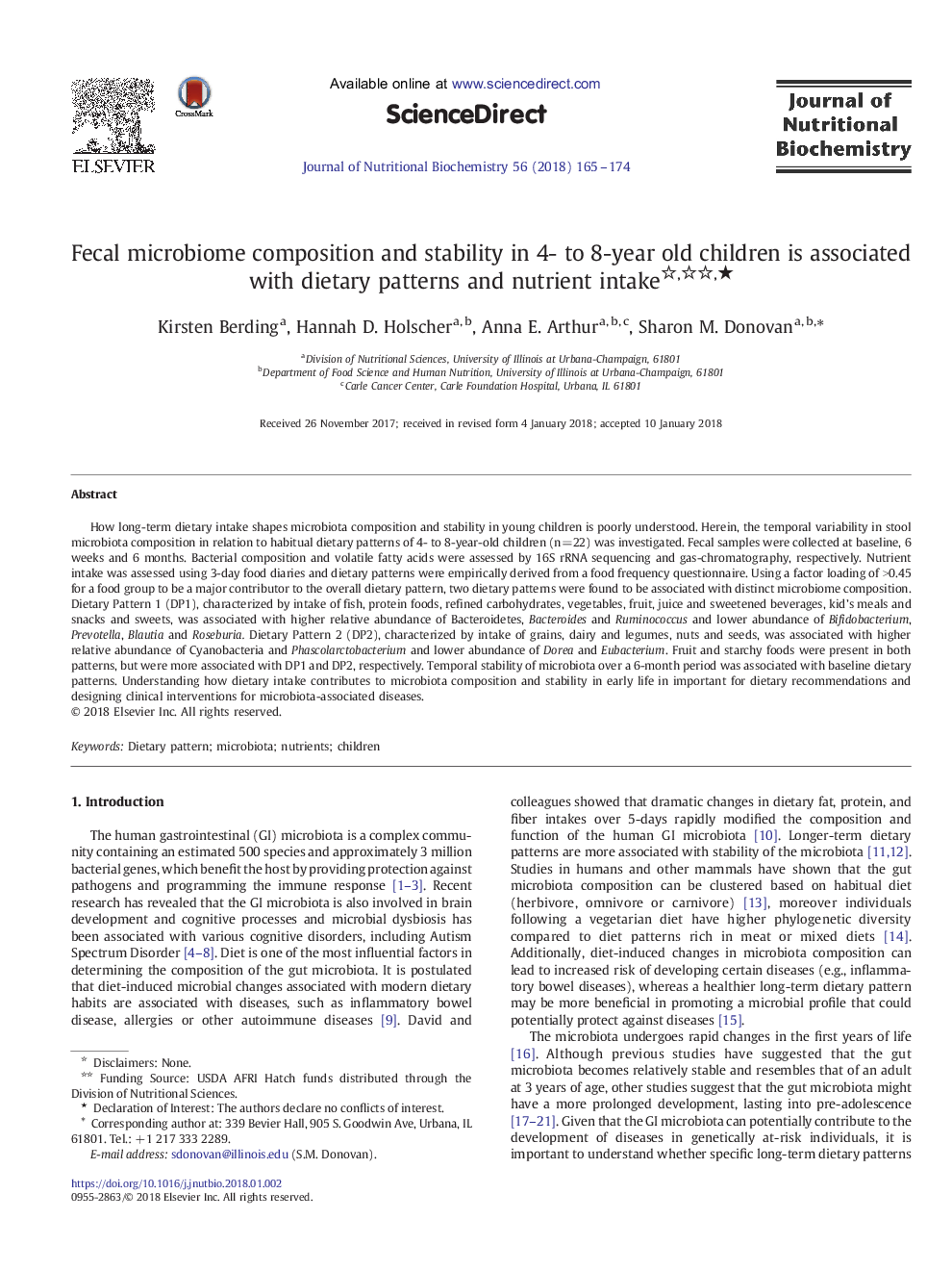| کد مقاله | کد نشریه | سال انتشار | مقاله انگلیسی | نسخه تمام متن |
|---|---|---|---|---|
| 8336371 | 1540612 | 2018 | 10 صفحه PDF | دانلود رایگان |
عنوان انگلیسی مقاله ISI
Fecal microbiome composition and stability in 4- to 8-year old children is associated with dietary patterns and nutrient intake
ترجمه فارسی عنوان
ترکیب میکروبیوم مدفوع و پایداری در کودکان 4 تا 8 ساله با الگوهای غذایی و مصرف مواد مغذی همراه است
دانلود مقاله + سفارش ترجمه
دانلود مقاله ISI انگلیسی
رایگان برای ایرانیان
کلمات کلیدی
الگوی رژیم غذایی، میکروبیا، مواد مغذی، فرزندان،
موضوعات مرتبط
علوم زیستی و بیوفناوری
بیوشیمی، ژنتیک و زیست شناسی مولکولی
زیست شیمی
چکیده انگلیسی
How long-term dietary intake shapes microbiota composition and stability in young children is poorly understood. Herein, the temporal variability in stool microbiota composition in relation to habitual dietary patterns of 4- to 8-year-old children (n=22) was investigated. Fecal samples were collected at baseline, 6 weeks and 6 months. Bacterial composition and volatile fatty acids were assessed by 16S rRNA sequencing and gas-chromatography, respectively. Nutrient intake was assessed using 3-day food diaries and dietary patterns were empirically derived from a food frequency questionnaire. Using a factor loading of >0.45 for a food group to be a major contributor to the overall dietary pattern, two dietary patterns were found to be associated with distinct microbiome composition. Dietary Pattern 1 (DP1), characterized by intake of fish, protein foods, refined carbohydrates, vegetables, fruit, juice and sweetened beverages, kid's meals and snacks and sweets, was associated with higher relative abundance of Bacteroidetes, Bacteroides and Ruminococcus and lower abundance of Bifidobacterium, Prevotella, Blautia and Roseburia. Dietary Pattern 2 (DP2), characterized by intake of grains, dairy and legumes, nuts and seeds, was associated with higher relative abundance of Cyanobacteria and Phascolarctobacterium and lower abundance of Dorea and Eubacterium. Fruit and starchy foods were present in both patterns, but were more associated with DP1 and DP2, respectively. Temporal stability of microbiota over a 6-month period was associated with baseline dietary patterns. Understanding how dietary intake contributes to microbiota composition and stability in early life in important for dietary recommendations and designing clinical interventions for microbiota-associated diseases.
ناشر
Database: Elsevier - ScienceDirect (ساینس دایرکت)
Journal: The Journal of Nutritional Biochemistry - Volume 56, June 2018, Pages 165-174
Journal: The Journal of Nutritional Biochemistry - Volume 56, June 2018, Pages 165-174
نویسندگان
Kirsten Berding, Hannah D. Holscher, Anna E. Arthur, Sharon M. Donovan,
